Tuesday, September 30, 2008
note to self: buy this book

I've always been bothered by the idea that stock prices were the value of a company, that the value and sale of stock could lead to the loss of jobs, even though there appears to be no connection between the two other than perception of worth. It seemed wrong to me, if not crazy. Well, I may be right, and this clip from Marjorie Kelly's book The Divine Right of Capital is my proof:
In an era when stock market wealth has seemed to grow on trees--and trillions have vanished as quickly as falling leaves--it's an apt time to ask ourselves, where does wealth come from? More precisely, where does the wealth of public corporations come from? Who creates it?Gambling. We base our economic decisions on the needs, opinions and say-so of a bunch of gamblers. America is, in fact, run by casino owners. No wonder we've developed such a love for state lotteries and Indian Gaming centers; they're just low-rent versions of our prime national obsession - striking big in Wall Street Roulette
To judge by the current arrangement in corporate America, one might suppose capital creates wealth--which is strange, because a pile of capital sitting there creates nothing. Yet capital providers--stockholders--lay claim to most wealth that public corporations generate. Corporations are believed to exist to maximize returns to shareholders. This is the law of the land, much as the divine right of kings was once the law of the land. In the dominant paradigm of business, it is not in the least controversial. Though it should be. What do shareholders contribute, to justify the extraordinary allegiance they receive? They take risk, we're told. They put their money on the line, so corporations might grow and prosper. Let's test the truth of this with a little quiz: Stockholders fund major public corporations--True or false? False. Or, actually, a tiny bit true--but for the most part, massively false. In fact, "investing" dollars don't go to AT&T but to other speculators. Equity investments reach a public corporation only when new common stock is sold--which for major corporations is a rare event. Among the Dow Jones industrials, many have sold no any new common stock in thirty or fifty years. The stock market works like a used car market, as accounting professor Ralph Estes observes in Tyranny of the Bottom Line. When you buy a 1999 Ford Explorer, the money goes not to Ford but to the previous owner of the car. Ford gets the buyer's money only when it sells a new car. Similarly, companies get stockholders' money only when they sell new common stock. According to figures from the Federal Reserve and the Securities and Exchange Commission, in any given year about one in one hundred dollars trading on public markets reaches a corporation. In other words, ninety-nine out of one hundred "invested" dollars are speculative. And the past wasn't much different. One accounting study of the steel industry examined capital expenditures over the first half of the twentieth century and found that issues of common stock provided only 5 percent of capital.
So what do stockholders contribute, to justify the extraordinary allegiance they receive? Very little. Yet this tiny contribution allows them essentially to install a pipeline and dictate that the corporation's sole purpose is to funnel wealth into it. The productive risk in building businesses is borne by entrepreneurs and their initial venture investors, who do contribute real investing dollars, to create real wealth. Those who buy stock at sixth or seventh hand, or one-thousandth hand, also take a risk--but it is a risk speculators take among themselves, trying to outwit one another, like gamblers. It has little to do with corporations, except this: public companies are required to provide new chips for the gaming table, into infinity. It's odd. And it's connected to a second oddity--that we believe stockholders are the corporation. When we say that a corporation did well, we mean that its shareholders did well. The company's local community might be devastated by plant closings. Employees might be shouldering a crushing workload. Still we will say, "The corporation did well." One does not see rising employee income as a measure of corporate success. Indeed, gains to employees are losses to the corporation. And this betrays an unconscious bias: that employees are not really part of the corporation. They have no claim on wealth they create, no say in governance, and no vote for the board of directors. They're not citizens of corporate society, but subjects. We think of this as the natural law of the market. It's more accurately the result of the corporate governance structure, which violates market principles. In real markets, everyone scrambles to get what they can, and they keep what they earn. In the construct of the corporation, one group gets what another earns. The oddity of it all is veiled by the incantation of a single, magical word: ownership. Because we say stockholders own corporations, they are permitted to contribute very little, and take quite a lot. What an extraordinary word. One is tempted to recall the comment that Lycophron, an ancient Greek philosopher, made during an early Athenian slave uprising against the aristocracy. "The splendour of noble birth is imaginary," he said, "and its prerogatives are based upon a mere word."
I've said this before, and I'll say it again. It's not capital gains taxes that should be cut, it's long-term investment gains that should be cut. Any capital gains that are made through speculation and short-term "investments" with no apparent intention of providing capital for the long haul should be taxed heavily. It's gambling, and it's no better than poker or craps - worse, because it's treated like it helps the nation, when in fact it absorbs funds that might be put to good use. Speculation has largely created this current financial crisis, which will cost us, the nation, billions (and in lost "value" in the stock market, has already "cost" trillions around the world). Imagine instead if that money had been truly invested in alternative energy start-ups, or infrastructure, or higher education.
What would America be like today if we quit placing our faith in Dame Fortuna and started placing it in the People?
props go to Bora for this big bitchin' quote.
Monday, September 29, 2008
Saturday, September 27, 2008
illusion
 Perhaps this delusion that by renaming the 13th floor as the 14th, and so "eliminating" the 13th is less "amazing" than it is illustrative of the kind of delusions that grips the people who occupy such buildings. Things dont go away just because you rename them.
Perhaps this delusion that by renaming the 13th floor as the 14th, and so "eliminating" the 13th is less "amazing" than it is illustrative of the kind of delusions that grips the people who occupy such buildings. Things dont go away just because you rename them. Though I suppose if you could get someone else to occupy your 13th floors for you... hmmmm... some suckers with money...
Though I suppose if you could get someone else to occupy your 13th floors for you... hmmmm... some suckers with money...
Friday, September 26, 2008
Thursday, September 25, 2008
riddle
Q: What's the difference between a conspiracy and a business plan?
A: Conspirators get caught.
A: Conspirators get caught.
two questions
Q: Which four nations are vastly better-off after eight years of Republican US leadership?This message has been brought to you by David Brin; or, at any rate, I stole it from his blog.
A: Iran, Saudi Arabia, Russia, and China.
Q: Which once-dominant world power has plummeted in power, strength, influence and by every conceivable measure?
A: The United States of America.
tickets, please!
Okay, is everybody ready for the next act in political theatre from the Republican Party Players?
 Watch! close now as John McCain, Mavrick Leader, postpones an Unimportant Debate with his Unworthy Candidate to wrangle those Troublesome GOP Collegues in the Congress back on board with his handy Resolution Trust mk.II., thus proving his leadership ability (bipartisan leadership ability, since he'll have the Most Enabling Opposition in the world By His Side)!
Watch! close now as John McCain, Mavrick Leader, postpones an Unimportant Debate with his Unworthy Candidate to wrangle those Troublesome GOP Collegues in the Congress back on board with his handy Resolution Trust mk.II., thus proving his leadership ability (bipartisan leadership ability, since he'll have the Most Enabling Opposition in the world By His Side)!
See! John McCain tame the savage Fiscal Hawks who've been resisting the Administration's plans for helping those who help themselves (to generous portions of the nation's money) by convincing them see that the plan will help everyone (banks by allowing them to continue being Monopoly Guys, and the People through Good Clean Hard Work)!
Marvel! as McCain changes socialist Water into more trickle-down Wine!
Boggle! as McCain takes credit for the biggest Con-Job ever, and The Press Applauds!
Dispair! as you realize that once more, We Will Be Fooled Again!
 Watch! close now as John McCain, Mavrick Leader, postpones an Unimportant Debate with his Unworthy Candidate to wrangle those Troublesome GOP Collegues in the Congress back on board with his handy Resolution Trust mk.II., thus proving his leadership ability (bipartisan leadership ability, since he'll have the Most Enabling Opposition in the world By His Side)!
Watch! close now as John McCain, Mavrick Leader, postpones an Unimportant Debate with his Unworthy Candidate to wrangle those Troublesome GOP Collegues in the Congress back on board with his handy Resolution Trust mk.II., thus proving his leadership ability (bipartisan leadership ability, since he'll have the Most Enabling Opposition in the world By His Side)!See! John McCain tame the savage Fiscal Hawks who've been resisting the Administration's plans for helping those who help themselves (to generous portions of the nation's money) by convincing them see that the plan will help everyone (banks by allowing them to continue being Monopoly Guys, and the People through Good Clean Hard Work)!
Marvel! as McCain changes socialist Water into more trickle-down Wine!
Boggle! as McCain takes credit for the biggest Con-Job ever, and The Press Applauds!
Dispair! as you realize that once more, We Will Be Fooled Again!
Wednesday, September 24, 2008
why rescue the failed middle-man?
let's just do it ourselves
Okay, I'm not sure I understand how the bailout plan being pushed by the Administration is good for anyone but the banking industry, specifically, those in charge of the banking industry, who get their fuck-ups, made with other people's money, wiped away with taxpayer money, all the while keeping their outrageous compensation that comes with almost any kind of job in the banking sector?
Listen, here's why they say we should do the bailout:
Why should taxpayers spend more money (that we dont actually have) to buy the bad loans of a failed bank, when they could instead spend that money on good loans to financial organizations that havent failed? Plus, I can guarantee you that the financial workings of our bank will be far more transparent than those of the institutions BushCo is currently proposing to bail out.
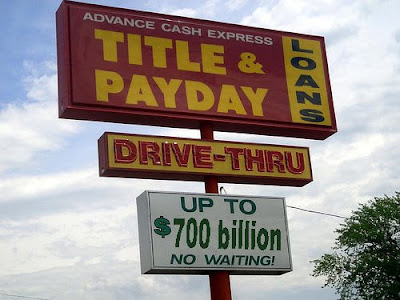
Listen, here's why they say we should do the bailout:
Getting those debts off their books should bolster those companies' balance sheets, making them more inclined to lend and easing one of the biggest choke points in the credit crisis.Now maybe I'm being naive here, but rather than buying up someone else's bad debt (often made by people who should've known better), how about instead the government sets itself up to do this lending they're so worried about, at least for the time being (perhaps the government's "company" can be bought out by a bank a few years down the line).
Why should taxpayers spend more money (that we dont actually have) to buy the bad loans of a failed bank, when they could instead spend that money on good loans to financial organizations that havent failed? Plus, I can guarantee you that the financial workings of our bank will be far more transparent than those of the institutions BushCo is currently proposing to bail out.

Tuesday, September 23, 2008
hard sell avoidence
The legislation the administration is promoting would allow the government to buy bad mortgages and other rotten assets held by troubled banks and financial institutions. Getting those debts off their books should bolster those companies' balance sheets, making them more inclined to lend and easing one of the biggest choke points in the credit crisis. If the plan works, it should help lift a major weight off the national economy that is already sputtering.So, let me get this straight: The proposed plan is that we use taxpayer money, the same money that we cant use to provide health care or affordable college educations, to buy bad debts from banks, so that they will be more willing/able to lend money again, and that they'll promise not to do such a bad job this next time.
Well, gee, how could the Congress possibly have a problem with that plan, and why do you suppose they're resisting the high-pressure sales tactics of the always-believable Bush Administration?
Monday, September 22, 2008
damn straight
 I dont mind other people having various tones and songs on their phone (one ringtone on my wife's phone cracks me up everytime I hear it), but it's not for me. I like a ring. If I had my way, the only phone in our house would be the big old black antique phone that's currently tucked away in the garage, replaced with a pair of wireless (one of which wont work) on a line which we almost never use anymore.
I dont mind other people having various tones and songs on their phone (one ringtone on my wife's phone cracks me up everytime I hear it), but it's not for me. I like a ring. If I had my way, the only phone in our house would be the big old black antique phone that's currently tucked away in the garage, replaced with a pair of wireless (one of which wont work) on a line which we almost never use anymore. I love my cell phone, but it has more to do with freedom of movement than it does any kind of a love of phones.
Sunday, September 21, 2008
proposal
 I realize that no one reads this thing anymore (I have a sitemeter account to prove it), but I'll toss this idea out anyway:
I realize that no one reads this thing anymore (I have a sitemeter account to prove it), but I'll toss this idea out anyway:How about creating a new "national insurance fund" which will be run by the government and funded by some sort of tax on financial transactions? This way, next time the Republicans convince us to let them "earn" money willy-nilly, then stick us with the bill, we'll have a little nest-egg all ready for that purpose. In this way it wont really even be a tax, since they'll get it all back in the end anyway.
Or do we want to keep paying as much for our banking as we do for our wars?
And why, do you suppose, that it's good for the nation to bail banks out a problem of their own making, "saving" us all from some hard financial times that might actually cause us to wise up and stop spending like drunken sailors with someone else's credit card, but bad to finance health care for children (at a considerably lower cost, I might add)?
Saturday, September 20, 2008
illusion
Friday, September 19, 2008
ARRRRR!!!

Today be the official Talk Like a Pirate Day, matey.
Avast!
And, no, so far there appears to be no official Talk Like A Ninja Day, sorry.
no, no, no, NO!
NEW YORK - Stocks are surging with the Dow Jones industrials up more than 300 points following a report that the federal government is considering creation of a repository for banks' bad debt.Well, of course they are. After all, what this means is that, once again, the American people will be asked to pay for the bad (unregulated) behavior of a few very greedy individuals. That once again the Republican philosophy of Privatized Profit and Socialized Debt is coming through for the wealthiest of us. That you can act in a manner which contains both stupidity and avarice, make out like a bandit, then walk away clean, letting others clean up the mess you made. This, apparently, was the lesson learned from the S&L crisis of the 80's (also a Republican decade), because while that particular unregulated fiasco cost taxpayers around $125 billion, this time the leaders of the financial sector have dug an even deeper hole, one which has spread itself around the world. How much do you suppose this crisis will cost?
CNBC said Treasury Secretary Henry Paulson is considering creation of an entity like the Resolution Trust Corp. that was formed after the failure of savings and loan banks in the 1980s.
The Dow, which had been showing modest moves in the final hour of trading, jumped nearly 330 points to the 10,939 level following the report.
In other words, the feudal tradition is alive and well in the great "democratic" nation of the United States of America. After all, those who have the money are the ones who deserve more of it, no matter how much anyone else has to work, right?
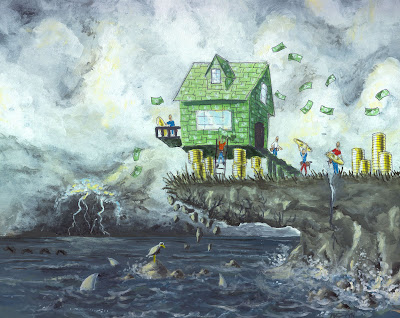 Wrong!
Wrong! It's time to end this idea that unrestrained markets are good for the nation. They are not, as we are very painfully finding out, AGAIN. It would be different if a lack of regulation ever seemed to work for anything more than to make a few people extremely rich in a short amount of time before collapsing onto the rest of us, but it doesnt.
One definition of insanity is to do the same thing over and over again and expect different results. What part of Resolution Trust pt. II sounds sane to you?
Thursday, September 18, 2008
hey! what's that over there?!

Today, John McCain he would fire Christopher Cox, Securities and Exchange Chairman, if he were president, accusing the former GOP congressman of betraying the public's trust. Because, for sure, it was the SEC guy who was carrying out the policies set by Congress and people like John McCain (who was a senator back in the good ol' days of the S&L crisis and the Keating Five) who should be held to blame. Let's see...
Choice A: Blame the guy who was in charge of carrying out the rules set by the congress, or...
Choice B: Blame the congress (and more specifically, Republicans), who had the concept that if people in charge of really huge amounts of money and who make their very large incomes by manipulating this money can be trusted to do what's right because otherwise they'll loose the money and so be punished for that loss.
Unless of course, they have the justice system tilted in their favor (stealing $5000 from a safe is a crime that'll result in a hefty jail-term, whereas "earning" $50,000,000 while loosing millions more that other people have investmented is just doing business, and failure will get you a "golden parachute").
Choice A: Blame the guy who was in charge of carrying out the rules set by the congress, or...
Choice B: Blame the congress (and more specifically, Republicans), who had the concept that if people in charge of really huge amounts of money and who make their very large incomes by manipulating this money can be trusted to do what's right because otherwise they'll loose the money and so be punished for that loss.
Unless of course, they have the justice system tilted in their favor (stealing $5000 from a safe is a crime that'll result in a hefty jail-term, whereas "earning" $50,000,000 while loosing millions more that other people have investmented is just doing business, and failure will get you a "golden parachute").
So, once again, the Republican candidate puts their greatest talent on display: the ability to find a straw-man to blame for their own bankrupt policies.
...the more they stay the same.
from the 1990's Book of Lists:
Nothing we didnt know already, and something the McCain campaign is still lying about.
Just out of curiosity, how does this figure compare to how much you paid in income taxes last year? My health insurance costs about $5000 a year not including all the co-pays. This was the cheapest plan available, with our choices ranging from this plan to one as much as over $12,000 a year (through my wife's teaching job). Tell me again that socialized medicine will cost me more.
There's nothing quite so accurate as a self-fulfilling prophecy.
If I could afford to hire a gardener, I'd be worried about whether he knew anything about horticulture, not what religion is he (or if he is a she), does he look like a gardener, has he ever smoked pot, or his opinions about Neil Sperry. What I want to know is, will he make my yard look good, or will he kill it? Any applicant for the gardener position who tells who tells me that gardens should be allowed to grow wild because gardening is futile (but that he looks great holding a hoe in a pair of coveralls) isnt going to get the job. I'm hiring a gardener for his knowledge of gardening, not his wardrobe. So why should it be any different in an election for the people we hire to run our country?
Interesting to think what the country might have been like today had we elected ol' Fritz to lead us. Would Clinton have triangulated us to the right so far if we had?
Walter Mondale's 10 Things He Would Have Done If Elected PresidentAs of September 2008, the total U.S. federal debt was approximately $9.7 trillion, about $31,700 per capita (according to Wikipedia) or an increase of about 60% since the year 2000. Actually, it's kind of refreshing to hear a politician say he'd raise taxes, a position about as popular these days among voters as doing chores is with teenagers (image what life would be like if teens could elect their parents, and hey! presto! you've got congressional budget policy).
Walter Mondale, Democratic vice-president under Jimmy Carter, ran unsuccessfully against Ronald Reagan for the presidency in 1984. If he had been given the chance, these are some of the things he would have liked to have done:
1. RAISED TAXES: Higher Taxes had to be a part of any real solution to America's fiscal crisis, which instead only got worse. In 1984 the budget deficit was $186 billion and the total federal debt was $1.6 trillion. By 1992 the budget deficit had grown to $320 billion and the total debt was more that $4 trillion.
2. TOLD THE TRUTH: See #1Need I say anything here? I mean, I'm not even sure where to start. WMDs, Alberto Gonzales, the entire Cheney vice (co)-presidency? The list of lies, spin, and deceptions is overwhelming.
3. OBEYED THE LAW: One of the most disturbing developments in modern American government is that some presidents seem to think they do not have to obey the law like everyone else. Thus the Watergate and Iran-Contra scandals.See #2. After that, shall we go on to signing statements? I'd also point out that the worst offenders by far are Republicans.
4. IMPROVED THE FAIRNESS OF THE TAX SYSTEM: During the 80's, the tax burden on the low- and moderate-income Americans went up, while the tax burden on the richest Americans went down."Since 2001, President Bush's tax cuts have shifted federal tax payments from the richest Americans to a wide swath of middle-class families, the Congressional Budget Office has found...". So it got worse.
Nothing we didnt know already, and something the McCain campaign is still lying about.
5. CONTROLLED AMERICA'S RUNAWAY HEALTH-CARE COSTS: In 1984 total health-care spending was $390 billion - about 10.3 percent of the gross national product. By 1992 health-care costs had grown to more than $800 billion - almost 14 percent of GNP.In 2007, total national health expenditures were expected to rise 6.9 percent — two times the rate of inflation.1 Total spending was $2.3 TRILLION in 2007, or $7600 per person.1 Total health care spending represented 16 percent of the gross domestic product (GDP).
Just out of curiosity, how does this figure compare to how much you paid in income taxes last year? My health insurance costs about $5000 a year not including all the co-pays. This was the cheapest plan available, with our choices ranging from this plan to one as much as over $12,000 a year (through my wife's teaching job). Tell me again that socialized medicine will cost me more.
6. STOOD UP TO THE WORLD'S DICTATORS: For too many years there was an insidious distinction in American foreign policy between the dictators who were "friendly" or "unfriendly". Any ruler who terrorizes his own citizens should not be considered a friend of the United States.No difference, except that now they're called "Allies in the War Against Terror", or states that "sponsor" terrorism.
7. HALTED AMERICA'S ILLEGAL WAR AGAINST NICARAGUA: This not-so-secret "covert war" shamed the United States in the eyes of the world community and showed our government in blatant violation of its own stated commitment to the rule of law in international affairs.Well, thank God we're no longer shaming ourselves with covert wars.
8. ELIMINATED THE STAR WARS STRATEGIC DEFENSE INITIATIVE: As its name suggests, Star Wars was never anything but a fantasy - a very dangerous and expensive fantasy."Star Wars" is dead, right? Now we've got a "missile defense" and I'm sure it works much better.
9. WORKED TO RESTORE PUBLIC TRUST IN GOVERNMENT: Lincoln once said: "With public trust, everything is possible; without it, nothing is possible."The Republican position, for decades now, has been that the government cannot be trusted to do anything. Americans seem to like that position, and so we elect them to office, and, sure enough, they're right!
There's nothing quite so accurate as a self-fulfilling prophecy.
10. ENROLLED IN A CLASS ON HOW TO SPEAK ON TV: This is the one thing I learned from Ronald Reagan.This may be saddest one of the bunch. Not because Walter Mondale feels the need to brush up on his telepresence, but because there actually is a need to do so. We might as well call our elections Pageants, and bring on the spray tan, botox and doublestick tape (oh, wait, never mind, too late).
If I could afford to hire a gardener, I'd be worried about whether he knew anything about horticulture, not what religion is he (or if he is a she), does he look like a gardener, has he ever smoked pot, or his opinions about Neil Sperry. What I want to know is, will he make my yard look good, or will he kill it? Any applicant for the gardener position who tells who tells me that gardens should be allowed to grow wild because gardening is futile (but that he looks great holding a hoe in a pair of coveralls) isnt going to get the job. I'm hiring a gardener for his knowledge of gardening, not his wardrobe. So why should it be any different in an election for the people we hire to run our country?
Interesting to think what the country might have been like today had we elected ol' Fritz to lead us. Would Clinton have triangulated us to the right so far if we had?
Wednesday, September 17, 2008
because a government bailout is better than charity
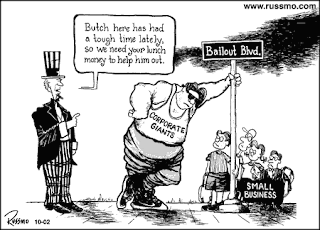 Seems to me that any company that is this important to the economy, ought to have been better (and more heavily) regulated by the government of that economy, especially when that government is supposedly of the soveriegn People.
Seems to me that any company that is this important to the economy, ought to have been better (and more heavily) regulated by the government of that economy, especially when that government is supposedly of the soveriegn People.Listen to Juli Niemann, a refreshingly honest executive vice president at Smith Moore & Company in Saint Louis, as she tells us how the economy's doing (not terribly well).
The most interesting point: bigger is not better, for the economy or for profit-making. So why is it, do you suppose, that companies want to become bigger? Could it be power, rather than profit? Or compensation for those running the company (there are big bonuses for those who make the deals, you know)?
small car blues
 Why cant we buy this car in the U.S.? It's made by GM, a company that otherwise seems to be struggling, the Europeans seem to feel it's safe enough, it sells all over the rest of the world, and it seems to be just the kind of car that a $4-a-gallon nation needs. So where is it? Are we waiting for China to export that to us also?
Why cant we buy this car in the U.S.? It's made by GM, a company that otherwise seems to be struggling, the Europeans seem to feel it's safe enough, it sells all over the rest of the world, and it seems to be just the kind of car that a $4-a-gallon nation needs. So where is it? Are we waiting for China to export that to us also?
Tuesday, September 16, 2008
Monday, September 15, 2008
a story of lost opportunity
 Once upon a time, I was standing in line at the SPCA, having brought in our new kitten to have it spayed. The room was crowded with people and pets and the line was long. As we stood there, waiting, an attendant would come out from time to time, calling out the name of the pet whose turn had come.
Once upon a time, I was standing in line at the SPCA, having brought in our new kitten to have it spayed. The room was crowded with people and pets and the line was long. As we stood there, waiting, an attendant would come out from time to time, calling out the name of the pet whose turn had come."Fido! Where's Fido?"
"Mittens! Who's Mittens?"
Then, came the opportunity of a lifetime, and I blew it. I just wasnt smart enough or fast enough to grab it. I still mourn the loss today.
"Spartacus! Where's Spartacus?"
I dont know if anyone else in the room would have gotten the joke or not, or if anyone else would've followed me in shouting out "I'm Spartacus!". But by God, I wish I'd yelled it out myself, because it would have been really, really funny.
Sunday, September 14, 2008
Saturday, September 13, 2008
Friday, September 12, 2008
listen up
I havent read the book (though I want to), nor even heard the entire interview (I will though, following the given link), but with just the short bit I heard while driving, I'm going to recommend Fresh Air's interview with Andrew J. Bacevich about his book The Limits of Power: The End of American Exceptionalism. Professor Bacevich, a retired army colonel, "argues that pragmatic realism has always been the core of American foreign policy, and current politicians would do well to remember that."
He also declares that America is built on the concept of "more", and that while that has been a source of great strength, propelling our young nation to the top of the global food chain, it is also a source of danger:
He also declares that America is built on the concept of "more", and that while that has been a source of great strength, propelling our young nation to the top of the global food chain, it is also a source of danger:
The ethic of self- gratification threatens the well- being of the United States. It does so not because Americans have lost touch with some mythical Puritan habits of hard work and self-abnegation, but because it saddles us with costly commitments abroad that we are increasingly ill-equipped to sustain while confronting us with dangers to which we have no ready response. As the prerequisites of the American way of life have grown, they have outstripped the means available to satisfy them. Americans of an earlier generation worried about bomber and missile gaps, both of which turned out to be fictitious. The present-day gap between requirements and the means available to satisfy those requirements is neither contrived nor imaginary. It is real and growing. This gap defines the crisis of American profligacy.The idea that the American need to have it all will be our downfall is not a new one; I think everyone knows that, subconciously at least. Hell, I've been describing Americans (especially Republicans) as spoiled teenagers who refuse to do their chores for years. But Bacevich says it much, much better than I do, and then goes on to say a whole lot more (read the Amazon blurb for an scale of the ideas that the book covers). His description of Ronald Reagan and how he appealed to the public after Jimmy Carter was worth the price of admission all by itself (and is rather chilling when one considers the possibility of an economic collapse in our future).
further proof

Want to get a better feeling for the destructive power of mockery in derailing something? Look no further than to Dennis Kucinich. A good man with the vision America needs, he's been sidelined because he's kind of funny-looking and "believes in UFOs". Yet he's the only one in office to have pushed hard for impeachment of the criminals heading up our government. Read him being sensible about 9-11, and weep for America.
photo opportunity

I'm swiping this from Dusty, because it's timely, and funny, and may come in handy during the McCain presidency.
Thursday, September 11, 2008
nothing
 Seven years later, and as disgusted as I am with the Bush Administration for all the bullshit, incompetence, and lack of resolve they've shown in the aftermath of that morning, I'm even more disgusted with the American public. I find it mind-boggling that anyone connected with the Republican party (as it has stood since that day) is still in any kind of position of power, influence, or is in any way allowed to represent this nation. Why do we, as a nation, tolerate this still?
Seven years later, and as disgusted as I am with the Bush Administration for all the bullshit, incompetence, and lack of resolve they've shown in the aftermath of that morning, I'm even more disgusted with the American public. I find it mind-boggling that anyone connected with the Republican party (as it has stood since that day) is still in any kind of position of power, influence, or is in any way allowed to represent this nation. Why do we, as a nation, tolerate this still?What has been done to address the attacks of 9-11? Anything? Other than restrictions upon Americans and a series of war-crimes with no connection to the attack itself?
And dont even get me started on the conspiracy crowd.
addendum: Seven years, and the yearly ritual at the site goes on, the same every year. And why should it not? Have those who lost their loved ones on that day recieved any kind of closure? No, they have not
Wednesday, September 10, 2008
quickie
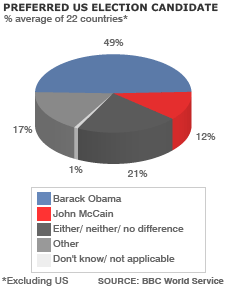
Ha-ha!
According to a BBC poll of 22,500 people polled in 22 countries, the world would prefer Obama to McCain by a 4 to 1 ratio.
Would that Americans were that smart! (The preceding assumes that our polls can be trusted, even though they rely on land-lines to get answers.)
Actually, it's not that funny, is it?
hike!
 Oh look, just when you thought it was safe to buy a gallon of gas (huh).
Oh look, just when you thought it was safe to buy a gallon of gas (huh). But no, OPEC, grown used to the fat sums of money that've been rolling in these last few years, has decided that since oil prices have fallen back down around $100 a barrel, that it's time to cut back on Supply so that Demand can do its price-raising magic. No doubt this will excite the interest of speculators, also. Perhaps we can get that roller coaster going again.
And do any ideas for getting the oil monkey off our back come out of Washington? Not really.
Yes, there's a lot of talk about alternative energy, but even more about drilling for more domestic oil. Guess what folks? In order to unlatch from the teat of OPEC, we would have to increase domestic production by at least 150%, and then sustain that level.
And where is the talk of conservation? Simple things like lowering the speed limit (physics dictates that going slower uses less energy - it doesnt matter how efficient your vehicle is, it will use less fuel at 55 mph than it will at 70. Period.) or taxing larger, more gas-guzzling vehicles at a higher rate. How about big tax credits for home improvements which increase energy efficiency?
Nope, sorry, all we get out of Washington is Drill! Drill! Drill! (But not in my backyard)!*
I wont even get into the issue of greenhouse emissions.
* I would argue that the primary reason that fuel prices have dropped lately is that it's become a foregone conclussion among speculators that the U.S. will drill, thus raining on the parade of speculators.
Tuesday, September 09, 2008
go see...
Uncounted. A film Emmy award-winning director David Earnhardt that
 I watched the film on the Starz movie channel, and it'll be on several more times during the next month, the next being Friday at 4:50 p.m. (eastern) on Starz Cinema (East). The film ought to be required viewing for anyone who remotely cares about any issue in America, because if those in power dont have to worry about how you vote, then they dont have to worry about what you think about anything.
I watched the film on the Starz movie channel, and it'll be on several more times during the next month, the next being Friday at 4:50 p.m. (eastern) on Starz Cinema (East). The film ought to be required viewing for anyone who remotely cares about any issue in America, because if those in power dont have to worry about how you vote, then they dont have to worry about what you think about anything.
More information can be found at Black Box Voting, an organization dedicated to, among other things, making electronic voting safe and accountable (and, yes, it can be so, but is not).
examines in factual, logical, and yet startling terms how easy it is to change election outcomes and undermine election integrity across the U.S.It lays down convincing evidence that not only has there been widespread voting fraud since 2000, but that it will most certainly happen again in 2008, specifically in places where electronic voting machines are being used. Machines which leave no paper trail, and have no way to check each and every individual vote one by one, which is the only way to assure that each vote is genuine and accounted for.
 I watched the film on the Starz movie channel, and it'll be on several more times during the next month, the next being Friday at 4:50 p.m. (eastern) on Starz Cinema (East). The film ought to be required viewing for anyone who remotely cares about any issue in America, because if those in power dont have to worry about how you vote, then they dont have to worry about what you think about anything.
I watched the film on the Starz movie channel, and it'll be on several more times during the next month, the next being Friday at 4:50 p.m. (eastern) on Starz Cinema (East). The film ought to be required viewing for anyone who remotely cares about any issue in America, because if those in power dont have to worry about how you vote, then they dont have to worry about what you think about anything.More information can be found at Black Box Voting, an organization dedicated to, among other things, making electronic voting safe and accountable (and, yes, it can be so, but is not).
Monday, September 08, 2008
sited
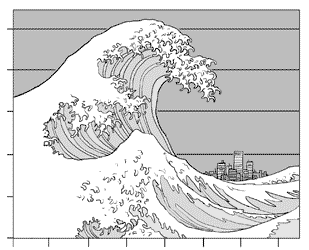
Had a bit of excitement here this weekend on the ol' blogstead. Somehow, a guy named "Omen" over at the Daily Kos got ahold of my "mock, paper, scissors" post, and liked it enough to quote it. From there it went to my old friend Coturnix's blog (at some point someone mentioned the Kos post in a comment on his site). Result: a huge swell in my site-meter numbers*.
Funny thing is, had I not checked them this weekend, I might never have even known. Even funnier? Not two weeks ago that same post was rejected by the Carnival of Liberals (update: twice, now), and I'd planned to rewrite it. Oh well.
Funny thing is, had I not checked them this weekend, I might never have even known. Even funnier? Not two weeks ago that same post was rejected by the Carnival of Liberals (update: twice, now), and I'd planned to rewrite it. Oh well.
* There's no real reason for me to look at Sitemeter, except to add momentum to my spiral of shame and depression.
Sunday, September 07, 2008
quote for the day:
low expectations edition
“So Lonestar, you see that evil will always win because good is stupid.”
Dark Helmet, in Spaceballs.
While I would prefer Obama over McCain, the truth is that it wont matter who's in charge until Americans pull their heads out of their asses, learn more about the democratic process from people who dont have a stake* in it one way or the other today, and then get up and demand change, not only through voting, but through protesting - loudly, vocally, and at the people making the decisions, rather than the poor bastards on the other side who have no more power than you do to change things.
Very little comes out of Washington any more which is good for ordinary Americans, even in a trickle-down sense. Over and over we're told that giving us relief from the high cost of pretty much everything, or from the relatively low pay for the work we do enriching the one-percenters, will only bankrupt the nation. So we slowly sink ourselves into insolvency while the few grow wealthier, all the while being told that our system is the best system because it's our system and so there can be nothing wrong with it.
*i.e., read the documents of the past themselves rather than some pundit's new book about the documents.
Saturday, September 06, 2008
quote for the day
"For John McCain, his suffering is an end to itself, the alpha and omega of his life. Beyond that, he's just a cranky fucker who pissed off everyone so now he's a "maverick," which is just a fancy word for 'dick.'"
The Rude Pundit
The Rude Pundit
saturday matinee
Wow, listen to Obama go. He's intelligent, well-spoken, mature, reasonable and gentlemanly. Unfortunately, that means absolutely nothing to at least half the country (and dont think I'm excluding Democrats from that group). In a nation where Republicans are not laughed off the stage (or tomato-pelted off)(or worse) after the last seven and a half years, I'm not terribly hopeful. But maybe that's just the media spin talking.
Something to remember folks: Polls only reach people with land-line telephones. Who do you suppose that growing demographic of people who dont have land-lines is more likely to vote for? So take heart, and dont let the bastards get you down.
props to Kel
Friday, September 05, 2008
question
 Okay, so, I kind of thought that the central tenant of a conservative was more or less, "if it aint broke, dont fix it". Conservatives dont like change, right, they prefer to maintain the status quo, especially if it is their status quo.
Okay, so, I kind of thought that the central tenant of a conservative was more or less, "if it aint broke, dont fix it". Conservatives dont like change, right, they prefer to maintain the status quo, especially if it is their status quo. So why is the Republican Party running a campaign where they are claiming to be the party of "change"? And why arent conservatives scratching their heads in puzzlement over that theme? After all, change from what? The last eight years of Republican governance?
The other day someone described St. Ronald Reagan as having "turned America around", and I thought, "turned it around from what?".
Thursday, September 04, 2008
observation
Isnt it funny that, because of the pregnancy of Bristol Palin, it will be Republicans who first have a unmarried teen pregnancy which is not only supported but "proudly" spotlighted?
Only Nixon could go to China!
Only Nixon could go to China!
Tuesday, September 02, 2008
question
Everytime I spell the word "Republican", I spell it "REpublican", then have to back up and change the "E" to lower case. Why do you suppose that is? I dont do it on any other words, just that one. Am I trying to tell myself something?
Subscribe to:
Posts (Atom)






